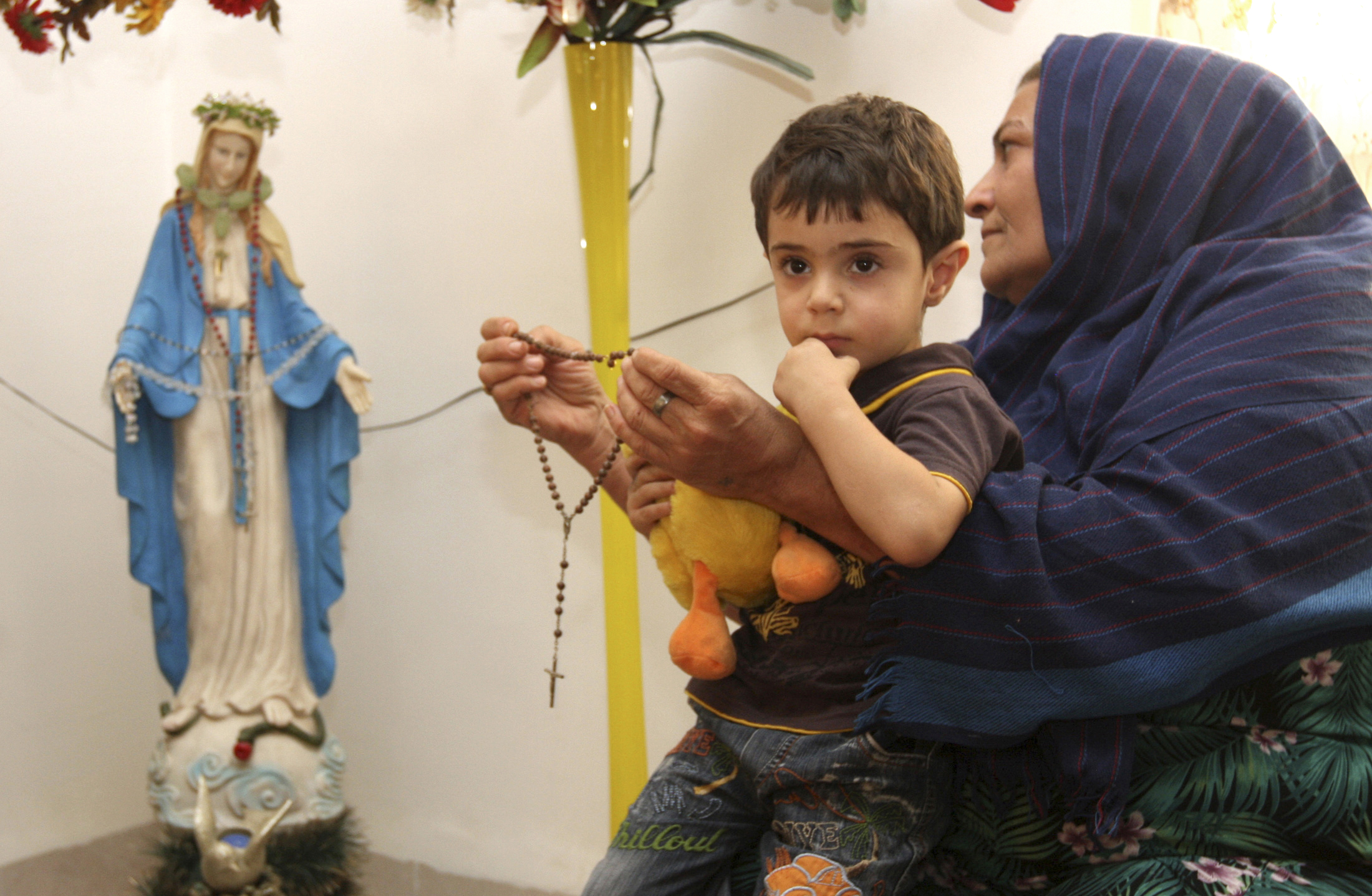What everyone gets wrong about the persecution of Christians in Iraq
This is not just a discussion about religious liberty


A free daily email with the biggest news stories of the day – and the best features from TheWeek.com
You are now subscribed
Your newsletter sign-up was successful
Media coverage of Christian persecution in the Middle East was once all but non-existent. (A representative headline on this website last year declared, "The world's most ancient Christian communities are being destroyed — and no one cares.") And while awareness of this troubling topic hasn't quite reached Biblical proportions yet, it's certainly increasing. CBS's 60 Minutes devoted several segments to the matter, National Geographic gave it a large spread in their magazine, and most recently, Newsweek devoted their cover story to "the new exodus" of Christians from the Middle East.
The persecution of Christians in the Middle East is a real problem that deserves real attention. Attacks on churches, forced conversions, and executions — including the beheading of 21 Coptic Christians in Libya — have provoked international outcry. Though reports on Iraq vary wildly, it seems that 90 percent of the country's Assyrian-Christians have fled or died since WWII, and as a result of al Qaeda and ISIS, Assyrian-Christians have been reduced to 1 percent or less of the general population. All this caused the U.S. Commission on International Religious Freedom to declare the flight of Christians from the region "unprecedented."
I'm an American Christian living in Iraq. I have been working for nearly a decade to save lives across this war-battered country. I am thankful for those who care about the people in this region who I have come to love so deeply.
The Week
Escape your echo chamber. Get the facts behind the news, plus analysis from multiple perspectives.

Sign up for The Week's Free Newsletters
From our morning news briefing to a weekly Good News Newsletter, get the best of The Week delivered directly to your inbox.
From our morning news briefing to a weekly Good News Newsletter, get the best of The Week delivered directly to your inbox.
That said, any non-sectarian observer who is actually here in Iraq can tell you that these "Whither the Christians!?" headlines are far too simplistic. The situation is more complicated than many American commentators realize. And the hand-wringing headlines may actually make things worse for those who live here.
When ISIS drove Christians out of Mosul in the summer of 2014, the West awoke to the plight of Christians in Iraq. But cramming the diverse group of victims into a tidy box marked "Christian" was not helpful. Locally, most of these "Christians" identify ethnically as Assyrians, and they are talking as much about Assyrian nationalism as religious identifiers like theology or tradition.
Western talk of "Christian persecution" generates more interest than "Assyrian genocide," as it naturally plays into the prepackaged Christianity-vs-Islam motif. But the sectarian fires that this narrative stokes could burn the very Christians — ahem, Assyrians — that Western sympathizers seek to help.
Good advocacy requires good listening, and what the Assyrians are asking for is more than the right to worship. Assyrians want an internationally recognized, self-governed province like their Kurdish neighbors. This is guaranteed to them in the Iraqi constitution, and was approved by the Council of Ministers in Baghdad in 2014. They are fighting a legal, political, and geographical fight for their homeland — not strictly for the right to believe or identify as Christians.
A free daily email with the biggest news stories of the day – and the best features from TheWeek.com
The American Mesopotamian Organization says "the primary mission of the [The Nineveh Plains Protection Unit (NPU)] is to 'protect the remaining Assyrian lands'" and "'liberate the Assyrian homeland of the Nineveh Plain' from the grasp of the radical Islamists,” according to Newsweek. The Dwekh Nawsha, a splinter militia founded by the Assyrian Patriotic Party, speaks in similar terms.
Yes, ISIS is ostensibly persecuting Assyrians because they are Christians, but they are more than that. They talk about the pain of historic and recent expropriations by Turks, Kurds, and Arabs, and the fear that their status as a unique indigenous people will be erased by further assimilation. By glossing over the ethnic/nationalistic component of their struggle, American activists risk missing their aims and adding to their pain by wrongly framing the discussion as one of religious liberty alone.
America is a young nation of immigrants, so we do not readily understand identity and faith in terms of land, place, and ancestral heritage. For this reason, I’d expect Americans to read Newsweek's follow-on quote by a British-Assyrian with skepticism: "This is our last stand, if this fails then Christianity will be finished in Iraq."
But this bald assertion is simply taken at face value by the Newsweek author, perhaps because it supports the pre-defined narrative, even though Christians (including Assyrian, Syriac, Chaldean, Anglicans, Protestants, and converts from Islam) still exist and worship in Dohuk, Erbil, Kirkuk, Sulaymaniyah, Baghdad, Nasiriyah, Basra, and beyond.
The Assyrian homeland may be forever lost if persecution persists, and this should be feared and fought against. But it need not mean the end of the Christian faith and tradition in the region.
Herein lies the rub: We can't have it both ways. We can't give money to upstart American "charities" that send weapons and vigilantes to fight alongside the NPU and Dwekh Nawsha and pretend that the "Christianity" we're seeking to save is anything other than a deeply complex and entrenched ethnic, political, legal, geographic, and religious battle for land and all the meaning that comes with it.
One militiaman speaking to The Washington Post summed up the dualism that is lost on many Western commentators: "During war times, we are Assyrians. We don't let anyone humiliate us. After the war, we go home to be Christians again."
Assyrians have a constitutional and human right to live in peace inside the borders of their ancient lands. I support their right to fight for their freedom. But that fight should be waged in the name of Assyria, of Iraq, and of humanity. This land has seen enough religious wars.
Jeremy Courtney is President of Preemptive Love Coalition, providing lifesaving heart surgeries to children in areas of polarizing conflict. He is bestselling author of Preemptive Love: Pursuing Peace One Heart at a Time. His work has been featured on CNN, FOX News, CBS News, BBC, and in TIME, and The Washington Post.
